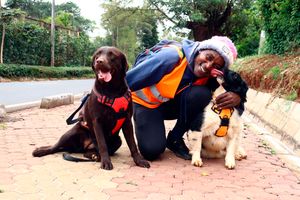
Naomi Njeri Kung'u, Support Communications Officer at the Kenya Society for the Protection and Care of Animals, plays with a dog rescued in Githurai and brought to the KSPCA in Karen, Nairobi, on February 11, 2025.
The police, in partnership with the Kenya Society for the Protection and Care of Animals (KSPCA), have launched a crackdown on illegal pet traders following rising cases of theft, mistreatment, overbreeding, and crossbreeding of the animals.
The booming pet economy means that legitimate breeders are struggling to meet the demand for pets, or the purebred animals are too expensive for Kenya’s middle-class and lower-income buyers, paving the way for ruthless traders.
Last week, the police nabbed a seller in Githurai, Kiambu County and rescued 30 animals, including dogs, rabbits, ducks, and turkeys.
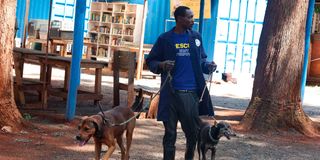
George Wekesa with dogs rescued from various places is pictured at the Kenya Society for the Protection and Care of Animals in Karen, Nairobi on February 11, 2025.
The animals had been locked in cramped-up cages, braving the scorching sun and the cold nights, awaiting buyers.
The recent raid in Githurai is just one of many that KSPCA and the police have conducted in Nairobi and its environs, highlighting how lucrative pet-selling has become.
Emma Ngugi, the CEO of the KSPCA said illegal breeding is becoming a widespread problem in Kenya.
“Overbreeding and illegal selling of animals is often associated with other kinds of criminal activities, such as pets used to smuggle drugs. The drugs are sewn inside the animal’s stomachs,” she said.
Patrick Ngaruiya, the Githurai location chief who was also at the raid, said, “For this particular operation, we got a tip-off from the members of the public who were angered by the poor living conditions of the animals and the fact that the animals were always kept caged.”
Sh200 for Labrador Retriever
Some of the dog breeds were the highly sought-after Japanese Spitz and Labrador Retrievers, which have become perfect companions in Kenyan homes. The traders sell them for Sh200 or Sh300 instead of the normal prices of Sh35,000 to Sh150,000 for purebred puppies and fully-grown dogs.
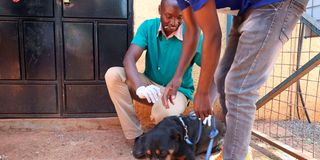
Dr Desmond Tutu, a veterinary surgeon with the Kenya Society for the Protection and Care of Animals, performs a microchipping exercise on a dog at the KSPCA in Karen, Nairobi, February 11, 2025.
Fred Midikila, a senior animal inspector at KSPCA, told Lifestyle that not many Kenyans know about animal cruelty.
“There is a belief that confining animals is the right way. However, the law states that an animal should be free to exercise its normal behaviour. Caging them infringes on their freedom. Also, such animals do not have access to veterinary care,” he said.
Under the Prevention of Cruelty to Animals Act, authorities can cease and remove animals from their owners if they are in distress.
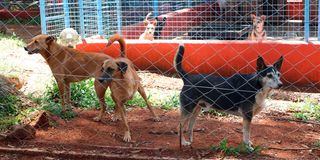
Some of the dogs rescued from various locations are pictured in a cage at the Kenya Society for the Protection and Care of Animals in Karen, Nairobi, on February 11, 2025.
Ms Ngugi adds that the legal process begins after moving the animals to safety.
“Now they are sick, tired and hungry and once they get better, we have to go to court and ask the court to permit us to give them up for adoption,” she said.
However, the legal process is not always smooth.
“It is rare for people to be prosecuted for animal cruelty. Another challenge is that court cases take time, and feeding and caring for animals before a ruling is made can be very expensive. It is also not the best thing for the animals to stay in the shelter for a long time.”
Also, the lack of adequate legislation poses a significant challenge to animal welfare. Ms Ngugi says there is no definite law in Kenya that criminalises overbreeding and the illegal trading of animals. “We rely on the Prevention of Cruelty to Animals Act to show that overbreeding and illegal animal trading amount to cruelty and should be punishable by law,” she said.
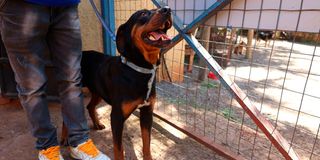
A dog that was rescued from a house in Githurai and brought to the Kenya Society for the Protection and Care of Animals in Karen, Nairobi on February 11, 202.
In Kenya, trading licenses are issued by the county government. Each county has its own laws governing the issuance of trading licenses to traders. In Nairobi County, Section 8 of the Nairobi City County Trade Licensing Act states, “A person who intends to operate any business or trade within the County shall obtain a trade licence.”
The Act provides punishment for any person who operates a business without a trading license. It says that the person will be subjected to a fine not exceeding Sh100,000 or to imprisonment for a term not exceeding six months.
Ms Ngugi said to tame this vice, Kenyans should stop buying pets from illegal breeders.
“Any right-thinking member of society can tell when an animal is sickly. Avoid buying such animals. You could be getting an animal that can bring diseases into your home. Our objective is to have a society where animals do not need rescuing but are receiving the right care,” she said.

